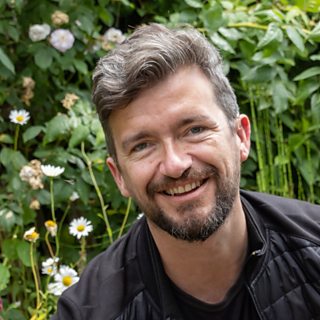Reunion is an emotional thriller of revenge and redemption following the journey of Daniel Brennan, a deaf man determined to right his wrongs while unravelling the truth behind the events that led him to prison. Brennan embodies the struggle of a man caught between two worlds, unable to fully integrate into the hearing world and shunned by the deaf community. Amidst this isolation, Brennan's only meaningful relationship is with his estranged daughter Carly, who he hasn't seen in over a decade.
Produced by Warp Films, the four-part series for BBC One and BBC iPlayer, is written by William Mager, a deaf writer originally from Sheffield. It is set and filmed in and around Sheffield and Doncaster. Find out more about the inspiration for the drama and William's writing career and advice below.
Watch Reunion on BBC One and BBC iPlayer from Monday 7th April
Have you always been a writer alongside your other work in directing and producing? What inspired you to write for the screen specifically?
The written word was always my favourite means of expressing myself, from an early age. There’s a clarity to the written word that doesn’t come with the spoken, or the signed. I did a degree in English Literature, only because I didn’t know what I wanted to do. Then at University I started reading scripts through the first script archive websites that began popping up online, and realising it was an art form I’d really love to explore. I got on to an MA in Writing for Film and Television after that, but on graduating I realised there weren’t enough opportunities for me to make it a sustainable career. We’re talking about a time when there were only five terrestrial channels and no streamers… so I went into factual television instead, starting out as a trainee in BBC New Media. But I was always writing, making short films as a director, and writing VTs and studio scripts for my day job. The writing muscle was always being worked, in some way. It was in 2019 that I decided to give up my day job as a series producer and become a writer. COVID hit soon after that meaning I had no choice but to double down!
You sent the script for the pilot episode of Reunion to the BBC Writers Open Call back in early 2022. What that did lead to for you, and what was the journey of the script after that? Did it surprise you at all?
Reunion was an idea I had in my head for a long time. I’d take it out of my drawer and look at it, then put it back. I wrote it for myself, almost a form of catharsis, expressing my anger and frustration and resentment at what life could be like for deaf people – married with the familiar tropes of my favourite Westerns and classic '60s and ‘70s thrillers like Point Blank, Get Carter – and of course, Dead Man’s Shoes which is a Warp Films classic.
I wrote the script, I was happy with it, and then it sort of went back to living in my drawer again. It was Joe Sims, an actor who lived locally and who I’d worked with before, who encouraged me to send it out to screenwriting competitions. When I started sending it out, I was shocked but also pleasantly surprised by how well received it was and how much people liked it.
I sent it to BBC Writers and was genuinely pleased to be accepted to the BBC Writers Drama Room 2022-2023 scheme. It’s a huge vote of confidence to be selected, and immediately catapults you into a higher level of writer – for me to get that with my first spec script was immense.
The course itself was great, but what I valued most was getting to meet and spend time with other writers. We’re a solitary lot at the best of times, and being able to trade war stories with them was great.
The story and script I developed with BBC Writers was immediately optioned by Warp Films instead of being sent out – I’m really excited about that as potentially my next project after Reunion.
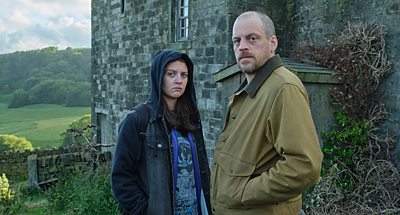
What is Reunion about?
Reunion is the story of a man called Daniel Brennan. He's just out of prison after ten years inside for committing a terrible crime. He's lost his family. He's lost his friends. He's lost the deaf community. Now he’s out, and he's on a journey of revenge. But that journey becomes something different from what he set out to do, and different from what the audience might be expecting. It starts as a typical story of revenge and then changes into something more emotional and more personal.
Tell us about collaborating with Warp Films, how did the project develop once they were involved?
When Warp Films optioned Reunion, I couldn’t believe my luck. I’m from Sheffield, and Warp is a Sheffield production company through and through. After spending a bit of time with Mark Herbert I gave him a sign name, Mister Sheffield! Warp have been brilliant to work with – Gwen Gorst and Siobhan Morgan worked with me for two years developing the story and the four scripts, getting them ready for production. I’ll never forget the first day on set, camera rolling, just looking around and seeing the actors, seeing the crew. It was just amazing to watch it come together.
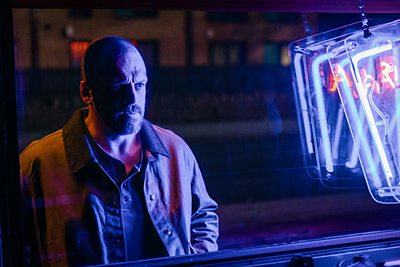
The series highlights the close-knit nature of deaf communities. Why was this key to how the audience understands Brennan's motives and experience when released from prison?
Our main character, Daniel Brennan grew up in the deaf community. All of his best friends and family are deaf. When he kills his best friend Ray, a man who is respected and looked up to by the rest of the community, he is immediately alienated from them all.
It becomes a double prison sentence for Brennan, he is in physical prison, but he finishes his time and comes out to a different kind of prison, where every deaf person he meets knows who he is and what he’s done, but not the why. Nobody knows why Brennan did what he did. Everyone has theories and ideas about what happened that night.
The deaf community can be a place of safety where you can be your authentic self, but when Brennan’s excluded from that, it becomes a very different thing for him, something more judgmental and claustrophobic, they've turned against him. It was interesting for us to explore this and how you deal with being rejected by the community that you love.
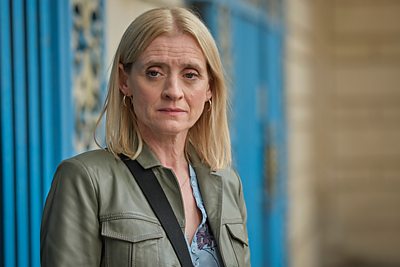
Reunion is set against a Yorkshire backdrop. How do you use these locations to heighten the drama throughout the series?
I grew up here and lived here for 22 years. One thing I always loved about Sheffield was that it’s a city of contrasts. It’s a former industrial town, with lots of reminders of its old factories and steelworks – then five minutes’ drive out of the centre and you're in beautiful rolling countryside. Our director Luke Snellin has made Sheffield look incredible too. It’s cinematic, it’s unique, it’s Sheffield.
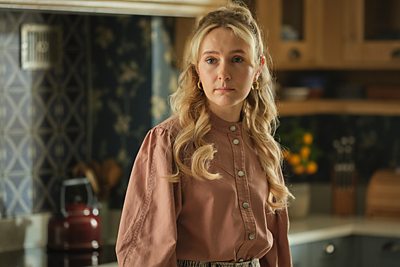
The series is bilingual, with both spoken English and BSL. How important was it to have both languages present throughout the series?
One thing I wanted to achieve with Reunion was to show the variety of communication methods that deaf and hard-of-hearing people use. Some people sign and speak at the same time, and some use British Sign Language alone without voice. Others use Sign Supported English (SSE) which follows spoken English grammar more closely. Some will add in elements of gesture.
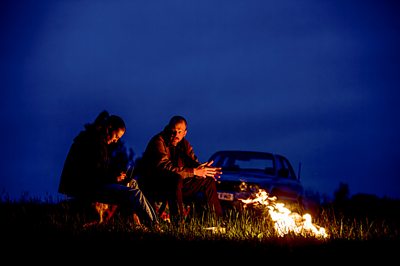
Was it difficult writing the bilingual element of it?
I wrote Reunion as a bilingual script from the start. I knew clearly who would be signing, who would be speaking, and who wouldn’t be signing at all. However, I had to use italics and bold text in the dialogue to show the different communication each character used. I thought about that carefully as it’s important to the story and to the characters, and to help the director navigate that. Every deaf person has their own style of communication, their own language, their own accent, so it was important for me that it wasn’t just bilingual, but multilingual.
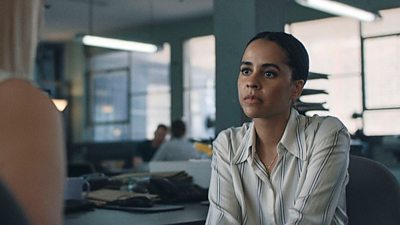
Can you tell us two things viewers can look forward to in Reunion?
The directing and visual style – Luke Snellin did an amazing job. He joined the production knowing very little about deaf culture and sign language but he booked a sign language class and embraced it wholeheartedly. He brought a cinematic visual style to the show and filmed the BSL beautifully.
Our lead actor – Matthew Gurney. I've known him for about 20 years, and he’s an incredible actor. I’m so happy that he finally gets this opportunity to show what he can do with Reunion. Our sign language consultant and BSL Coach Duffy says that seeing Matty, a deaf actor, as number one on the call sheet gave him goosebumps. Being number one also means that Matty carries a lot of responsibility on his shoulders, but seeing him on screen holding his own with the likes of Eddie Marsan and Anne-Marie Duff is incredible. I really hope he goes on to do more after Reunion.
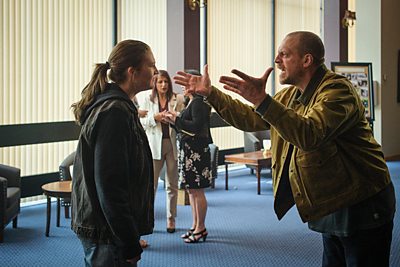
Can you explain to us what a sign name is?
A sign name is given to you by your peers in the deaf community. It’s not always the name that you want to be given, but it’s based on a very personal trait. This could be physical, a play on words, or personality-based; but it’s a name you have to accept!
My sign name is ‘piano’ (both hands moving side to side, playing invisible keys on a piano). Over 20 years ago, I was on a Channel 4 TV show called VEE TV, talking about my love of playing the piano (which I’ve since grown out of). The next day I went to a deaf pub in Victoria. As I walked through the door a deaf man pointed at me and said ‘Look, it's the Piano Man!’, and that was it, it’s stuck with me ever since. I also met my wife through making that bloody piano film, so it’s a trade-off I’ll happily accept – and I know deaf people with much, much worse sign names.
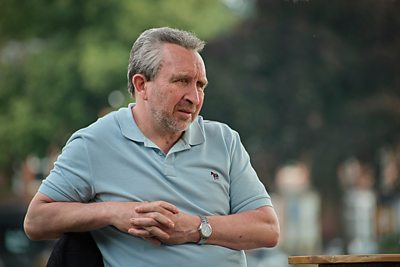
Why should people watch the show?
I hope people will come to Reunion for a different kind of story. It’s set within the deaf world, it features a lot of sign language – but Reunion is also about hope. It’s about a man who’s lost everything: his wife, his daughter, his best friend, and his community – but deep down, he still has hope that maybe one day, he’ll find a way to live again.

What’s the best advice you’ve been given about writing that you can share?
“Write what you know” is always going to hold true, but that doesn’t mean ONLY writing what you know. You can write anything you want, as long as it feels true to your own lived experience. Write that space western, write that romance set in Mexico – as long as the characters feel real to you based on what you’ve learned from living life.
I’d also say – write WHO you know. Write characters with traits based on people you’ve met, people you’ve worked with. And write for actors you admire. Not necessarily famous ones – maybe there’s an actor you know that is desperate for the right script, the right role. Matthew Gurney was one of them. I wrote the character of Daniel Brennan with him in mind from the very start, and he was absolutely brilliant.
Related Links
-
Watch Reunion on BBC iPlayer
-
'Normally deaf people are portrayed as pitiful - this is different' Read the BBC News article

